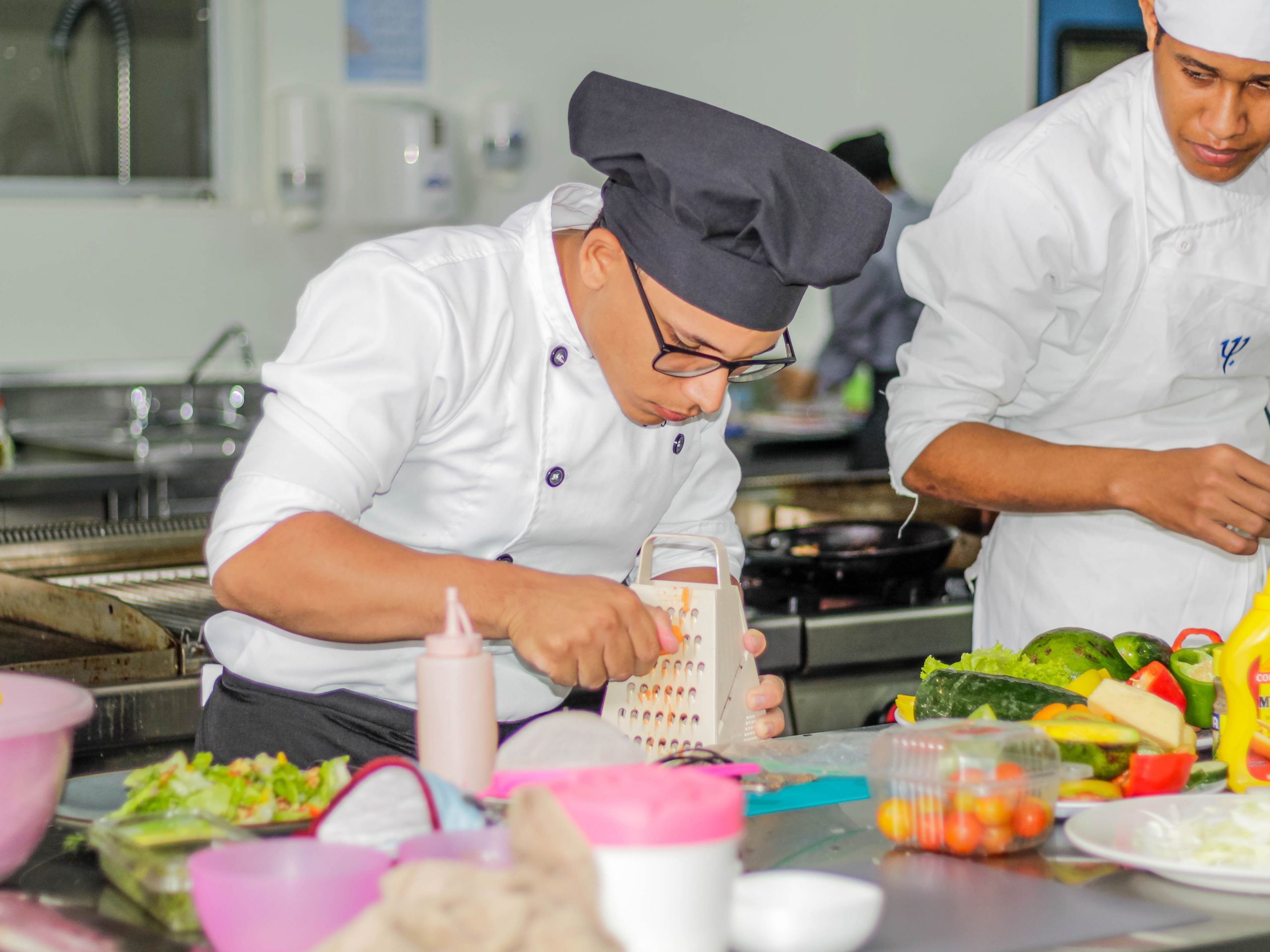Creative Cooking Diploma 2023
In the dynamic world of gastronomy, I am pleased to announce with great enthusiasm the arrival of the third edition of the Creative Cooking Diploma 2023, a project that goes beyond teaching and becomes a catalyst for opportunities for Dominican youth. This program, born as a vision to empower young enthusiasts of gastronomy, has become a platform to discover and nurture local talent. By supporting this diploma, my goal is to provide these young individuals not only with advanced culinary skills, but also to open doors to a future where their creativity can shine on the world gastronomic stage. The initiative to send the most outstanding student to the prestigious Basque Culinary Center in Spain continues, offering a unique experience that transcends geographical and cultural boundaries. This year, as in previous editions, we seek to highlight innovation, passion, and a commitment to excellence in the kitchen. I hope that this diploma serves as a springboard to new horizons, new connections, and, above all, to the flourishing of Dominican talent on the international stage. By continuing to support initiatives like this, we contribute not only to the individual development of participants but also to the enrichment of the rich Dominican culinary heritage. Welcome to the
The Growing Demand for Vegan Options in the Gastronomy Industry
At the crossroads of culinary innovation and evolving consumer preferences, the gastronomy industry finds itself in an unprecedented transformation. In this article, I am pleased to address the growing demand for vegan options, a phenomenon that extends beyond being a passing trend and solidifies itself as an essential element for the future of the sector. According to a report by EMR Expert Reports, the vegan food sector recorded a significant value, surpassing $24.59 billion in 2022. Projections indicate steady growth, with an estimated CAGR of 10.1% between 2023 and 2028. It is anticipated that by 2028, this market will have exceeded $43.8 billion, showcasing sustained momentum in the preference for such food options. Similarly, data from Research and Markets confirms this trend, revealing that the vegan food market reached a value of over $37.93 billion in 2022, projecting robust growth with the expectation of reaching over $71.26 billion by the year 2030. With that said, the growth of vegan cuisine in the gastronomy industry is driven by several factors, including the rise in awareness of healthy diets, growing concerns about sustainability and the environment, as well as the integration of technological advances in food, that have led to the development of plant-based alternatives
Grupo Xcaret Success Story
Tourism is a cornerstone of the Mexican economy, and one of the standout destinations in this industry is the stunning Riviera Maya. In this setting, Grupo Xcaret, a 100% Mexican company and a leader in sustainable tourism, has grown alongside this region for 30 years, developing a portfolio of seven natural parks: Xcaret, Xel-Há, Xenses, Xoximilco, Xavage, Xplor, and Xplor Fuego, along with three tours of archaeological sites and 900 rooms offered at the Hotel Xcaret México. Thanks to this, in 2019, it achieved a remarkable milestone, amassing four million visitors since its inception. In this regard, Xcaret's success is due to a combination of factors, with a focus on sustainability, excellence in customer service, and innovation being among the most prominent. The importance of sustainability: Grupo Xcaret has led the way in sustainability by blending entertainment offerings with environmental conservation. Its natural parks stand as a testament to this commitment, allowing visitors to enjoy the beauty of the Riviera Maya while becoming aware of the importance of protecting it. However, this commitment extends beyond nature preservation; it also encompasses the promotion of Mexico's rich culture. Every experience at a Xcaret park is infused with authenticity and national pride. Visitors can immerse
The new era of luxury sustainability in hospitality
We have been discussing how 2023 is the year of sustainability across all sectors. However, this time, I am pleased to address a crucial aspect of this paradigm shift: sustainability in the hotel industry applied to luxury, which translates into the pursuit of a balance between exclusive comfort and environmental responsibility. That said, hotel sustainability is not a trend but a solid commitment to preserving the environment and the local community. Incorporating this concept into luxury goes beyond a mere "green" label and manifests in specific practices aimed at reducing the environmental and social impact of the hotel industry. Eco-Luxury stands as an example of industry progress, reflecting the increasing awareness among both hoteliers and travelers. The integration of sustainable practices in the luxury sector is not only appealing to environmentally conscious travelers but also contributes to preserving local traditions, supporting community livelihoods, and ensuring the conservation of natural resources for future generations. Growing trend and market data According to Facts and Factors, the global luxury hotel market was valued at approximately $95.11 billion in 2021 and is expected to reach $160.48 billion by 2028, with a compound annual growth rate (CAGR) of about 4.95% between 2022 and 2028. On the other hand, according to
Wellness is the new luxury in hotels
We live in an era where the awareness of well-being and health has become a guiding light in our daily decisions, and the COVID-19 pandemic, with its undeniable influence, has acted as a catalyst in how we perceive and value these aspects in our everyday lives, even influencing our choices when planning trips or vacations. According to a report by Grand View Research, the global wellness tourism market reached a value of $814.6 billion in 2022, with a projected steady annual growth of 12.42% from 2023 to 2030. Furthermore, the Wellness Tourism Market Outlook from Fact MR predicts this market to reach $2.3 trillion by the end of 2033, starting from $880 billion in 2023. Beyond the COVID-19 pandemic, social media plays a pivotal role in the evolution of this ongoing trend towards well-being. Influencers, well-known figures, and enthusiasts worldwide share their experiences in yoga, meditation, healthy eating, and self-care during their vacations, directly influencing travelers' expectations and reshaping not only what we expect from the destinations we visit but also what we demand from hotels. Just over a fifth (21%) of global travelers are currently traveling for health and wellness reasons, according to a 2022 Travel Trends study conducted by the luxury
Why the beverage industry continues to experience sustained growth and the key industry trends
The beverage industry, particularly the alcoholic beverages market, is maintaining steady growth, fueled by a range of factors influencing consumer preferences and emerging trends. In this context, I am pleased to examine why the beverage industry continues to thrive, taking into consideration some of the trends shaping the sector. The market for alcoholic beverages is astonishing in its magnitude. According to Statista data, revenues in the alcoholic beverages market reached an impressive figure of $1,609.00 billion in 2023, and it is projected to experience annual growth of 5.42% until 2027. An interesting highlight from the report is that the largest market segment is that of beer, representing a market volume of $610.00 billion in 2023. Consumer preferences play a pivotal role in this growth. According to data presented in the report, the demand for unique and premium alcoholic beverages is consistently rising globally, with consumers willing to invest more in high-quality products that offer distinctive flavors and experiences. This has led to an increase in the demand for craft beers and artisanal spirits, as well as limited-production wines, demonstrating that consumer palates' sophistication has also boosted the popularity of premium alcoholic beverages. According to the Distilled Spirits Council of the United States, in
How are TikTok Trends Affecting the Eating Habits of the New Generation?
We live in a constantly evolving digital era where social media has transformed the way we communicate, consume content, and yes, even how we eat. Among these platforms, TikTok has stood out as a cultural phenomenon, especially among the younger generation. It's no surprise to announce that TikTok has become one of the most influential social networks. In just two years, it has become one of the social networks with the most active users and recorded a revenue of over $9 billion in 2022 alone. But beyond dance and entertainment videos, TikTok has proven to be fertile ground for exploring the world of food and beverages. According to data from News Room TikTok, 68% of TikTok users have discovered a food or beverage brand by seeing it on the platform, and 46% have purchased a food or beverage product after seeing it on TikTok. Furthermore, 72% of these purchases were unplanned. One of the most notable ways TikTok is affecting eating habits is through viral food trends. Videos featuring clever and delicious recipes can go viral in a matter of hours. The result? Users, mostly young people, feel the need to try these culinary creations for themselves. For example, the "TikTok bread" recipe,
The Evolution of Tourism and Hotel Performance in the Post-Pandemic World
The world of tourism and the hotel industry have witnessed a remarkable evolution in recent years, especially in the context of a world marked by the COVID-19 pandemic. According to the latest World Tourism Barometer from the World Tourism Organization (UNWTO), international tourist arrivals in the first quarter of 2023 have reached an impressive 80% of pre-pandemic levels, compared to the same period in 2019. This 86% growth from the previous year reflects the ongoing strength of international tourism, with approximately 235 million tourists traveling internationally during the first three months of the year. In this dynamic context, hotels play a fundamental role as they have had to adapt and evolve to meet the changing demands of travelers while providing memorable experiences. Emerging tourism trends As we have discussed on previous occasions, sustainability has become a key aspect of tourism in 2023. Travelers are increasingly concerned about the environmental and societal impact of their trips, charting new paths to destinations that not only captivate their imagination but also contribute to environmental conservation. Concrete examples of this trend include the growing demand for eco-friendly accommodations, the rise of volunteer travel, and the popularity of destinations with sustainability certifications. Furthermore, health and wellness tourism has taken on a
Women entrepreneurship in the gastronomy industry
In the midst of the 21st century, the gastronomy industry remains a battleground where women strive to carve out their place in a world dominated by deeply rooted gender stereotypes. While women are often the queens of the kitchen in our homes, the most prestigious and visible positions in renowned restaurants are predominantly occupied by men. According to data from ONU Women (2020), less than 4% of chefs with three Michelin stars (the highest culinary distinction) are women. This imbalance is undeniable and reflects a reality that, despite social advancements, still persists. María Canabal, a journalist and founder of Parabere Forum, presented an even more revealing perspective at the 2017 Paralelo Norte forum: 93% of those who cook at home are women, 48% of culinary school graduates are women, and 39% of restaurant cooks are women, yet only 18% of women in the industry are chefs, that is, head chefs. This stark gap between women's presence in the kitchen and their representation in leadership positions highlights the challenges faced by women entrepreneurs in this sector. Let's delve into some of the main challenges: - Gender wage gap: women often earn less than men for the same work. - Inequality in task distribution: women still
The keys to success in the tourism industry
The tourism and hospitality industry, with its unmistakable charm, is constantly in motion and evolution. In a world where mobility and curiosity are the norm, excelling in this competitive sector is an art that combines a passion for travel with the ability to offer exceptional experiences. In this article, we will delve into some of the essential keys to success in the tourism industry. Offering a unique and memorable travel experience: travelers seek more than just destinations; they crave experiences that differ from their everyday lives. Experiential tourism is a concrete example of this, as it is a growing trend where travelers increasingly seek authentic, memorable experiences that leave a positive impact on them. Adapting to market trends: the tourism sector is constantly evolving, so companies must stay up-to-date with the latest trends and adapt their products and services accordingly. For example, the increasing demand for sustainable travel has led many tourism businesses to offer environmentally friendly products and services. Continuous innovation: innovation is the backbone of success in any industry, and tourism companies must provide innovative products and services. As Zurab Pololikashvili, Secretary-General of the World Tourism Organization (UNWTO), pointed out, "tourism companies must leverage new technologies to offer more personalized and










